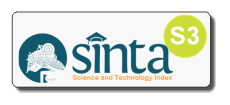The Mediating Effect of Self-Efficacy on Perceived Supervisor Support on Self-Perceived Employability in Generation Z Participating in the Certified Internship and Independent Study Program
Abstract
According to demographic trends, Generation Z was 25 percent of the labor force by 2030. Generation Z needs extra preparation because of a lack of work experience and has a propensity for having negative attitudes at work. Participating in an internship program like the Certified Internship and Independent Study is one of those preparations. Participants in this internship gain both practical work and supervised experience by their supervisor. This research aimed to investigate if the existence of self-efficacy can influence self-perceived employability as a mediator and perceived supervisor support as a predictor. The research method used a quantitative approach to 160 Generation Z members participating in the batch 3 internship program (25.5 percent of the population) at an IT company. Hypothesis testing was carried out with the mediation analysis model in the medmod module in Jamovi 2.3.26. The main result was that self-efficacy could partially mediate the effect of perceived supervisor support on self-perceived employability. This means that the existence of self-efficacy can indirectly increase the influence of perceived supervisor support on self-perceived employability. The direct influence of perceived supervisor support on self-perceived employability is smaller than when involving self-efficacy as a mediator. Based on this result, interventions can be made to strengthen the self-efficacy of internship participants, for example, by providing a strong experience so that the supervision program during an internship can strengthen the self-perceived employability of internship participants. In the end, the intern participants can feel the added value of their internship program.
Full Text:
PDFReferences
Afzal, S., Arshad, M., Saleem, S., & Farooq, O. (2019). The Impact of Perceived Supervisor Support on Employees’ Turnover Intention and Task Performance: Mediation of Self-Efficacy. Journal of Management Development, 38(5), 369–382. https://doi.org/10.1108/JMD-03-2019-0076
Ahmed, H., Nawaz, S., & Rasheed, M. I. (2019). Self-Efficacy, Self-Esteem, and Career Success: The Role of Perceived Employability. Journal of Management Sciences, 6(2), 18–32.
American Psychological Association. (2023). Self-Efficacy. In APA Dictionary of Psychology. Washington DC: American Psychological Association. Retrieved from https://dictionary.apa.org/
Arrianti, M. (2017). Keyakinan Diri (Self Efficacy) dan Intensi Perilaku Mencontek Pada Saat Ujian (Studi Kasus pada Sekelompok Mahasiswa Jurusan BPI) (Bachelor’s thesis). Universitas Islam Negeri Raden Fattah, Palembang. Retrieved from http://perpus.radenfatah.ac.id
Astuti, L. D. P. & Sherly. (2022, August 25). Nadiem Makarim Minta Mahasiswa Baru Ikuti Program Kampus Merdeka. Viva.co.id. Retrieved from https://www.viva.co.id/edukasi/1513457-nadiem-makarim-minta-mahasiswa-baru-ikuti-program-kampus-merdeka
Atitsogbe, K. A., Mama, N. P., Sovet, L., Pari, P., & Rossier, J. (2019). Perceived Employability and Entrepreneurial Intentions Across University Students and Job Seekers in Togo: The Effect of Career Adaptability and Self-Efficacy. Frontiers in Psychology, 10. https://doi.org/10.3389/fpsyg.2019.00180
Bhate, R. (2013). Supervisor Supportiveness: Global Perspectives. Sloan Center on Aging & Work at Boston College. Retrieved from http://dlib.bc.edu/islandora/object/bc-ir:100630
Burns, K. L. (2016). Perceived Organizational Support and Perceived Supervisor Support as Antecedents of Work Engagement (Master’s thesis). San Jose State University, San Jose. Retrieved from https://scholarworks.sjsu.edu/etd_theses/4678
Chow, H. J., Wong, S. C., & Lim, C. S. (2019). Examining Mediating Role of Self-Efficacy on Undergraduates’ Perceived Employability. International Journal of Academic Research in Business and Social Sciences, 9(6), 135–154.
Direktorat Jenderal Pendidikan Tinggi, Riset, dan Teknologi. (2022). Apa itu Magang? Kampus Merdeka. Retrieved from https://kampusmerdeka.kemdikbud.go.id/program/magang/detail
Eisenberger, R., Stinglhamber, F., Vandenberghe, C., Sucharski, I. L., & Rhoades, L. (2002). Perceived Supervisor Support: Contributions to Perceived Organizational Support and Employee Retention. Journal of Applied Psychology, 87(3), 565–573. https://doi.org/10.1037/0021-9010.87.3.565
Ekmekcioglu, E. B. (2020). Perceived Supervisor Support, Work Engagement and Career-Related Self-Efficacy: An Empirical Study. The Eurasia Proceedings of Educational and Social Sciences, 19, 23–30.
Erlangga, A. (2022). Pengaruh Keaktifan Berorganisasi dan Program Magang terhadap Kesiapan Kerja dengan Self Efficacy sebagai Variabel Mediasi (Studi Kasus Mahasiswa Universitas Kristen Satya Wacana) (Bachelor’s thesis). Universitas Kristen Satya Wacana, Salatiga. Retrieved from https://repository.uksw.edu//handle/123456789/26705
Gomez, K., Mawhinney, T., & Betts, K. (n.d.). Welcome to Generation Z. Network of Executive Women (NEW) & Deloitte. Retrieved from https://www2.deloitte.com/content/dam/Deloitte/us/Documents/consumer-business/welcome-to-gen-z.pdf
Gordon, S., Adler, H., Day, J., & Sydnor, S. (2019). Perceived Supervisor Support: A Study of Select-Service Hotel Employees. Journal of Hospitality and Tourism Management, 38, 82–90. https://doi.org/10.1016/j.jhtm.2018.12.002
Gupta, R., & Ansari, A. (2023). The Impact of Perceived Employability on the Employment Quality of Management Graduates: The Mediating Role of Focused Job Search. International Journal of Management Studies, 30(2), 397–428. https://doi.org/10.32890/ijms2023.30.2.8
Hayes, A. F. (2013). Introduction to Mediation, Moderation, and Conditional Process Analysis: A Regression-Based Approach. New York: Guilford Press.
Lestari, F. D., & Ubaidillah, H. (2022). Pengaruh Internship Experience, Motivation, dan Academic Achievement terhadap Kesiapan Mahasiswa dalam Memasuki Dunia Kerja dengan Self Efficacy sebagai Moderating Variable (Studi Pada Mahasiswa Manajemen Universitas Muhammadiyah Sidoarjo). Journal of Islamic and Muhammadiyah Studies, 3, 10.21070/jims.v3i0.1565-10.21070/jims.v3i0.1565. https://doi.org/10.21070/jims.v3i0.1565
Luszczynska, A., Gutiérrez-Doña, B., & Schwarzer, R. (2005). General Self-Efficacy in Various Domains of Human Functioning: Evidence From Five Countries. International Journal of Psychology, 40(2), 80–89. https://doi.org/10.1080/00207590444000041
MacKinnon, D. P., Fairchild, A. J., & Fritz, M. S. (2007). Mediation Analysis. Annual Review of Psychology, 58, 593–614. https://doi.org/10.1146/annurev.psych.58.110405.085542
Maddux, J. E. (1991). Self-Efficacy. In Pergamon General Psychology Series: Vol. 162. Handbook of Social and Clinical Psychology: The Health Perspective (pp. 57–78). Elmsford: Pergamon Press.
Mendikbudristek: MSIB Bukan Program Magang Biasa. (2022, June 17). Direktorat Jenderal Pendidikan Tinggi Kementerian Pendidikan dan Kebudayaan Republik Indonesia. Retrieved from https://dikti.kemdikbud.go.id/festival-kampus-merdeka/mendikbudristek-msib-bukan-program-magang-biasa/
Nazar, G., & van der Heijden, B. I. J. M. (2012). Career Identity and Its Impact Upon Self-Perceived Employability Among Chilean Male Middle-Aged Managers. Human Resource Development International, 15(2), 141–156. https://doi.org/10.1080/13678868.2012.664692
Nghia, T. L. H., & Duyen, N. T. M. (2019). Developing and Validating a Scale for Evaluating Internship-Related Learning Outcomes. Higher Education, 77(1), 1–18. https://doi.org/10.1007/s10734-018-0251-4
Nindyati, A. D., & Iskandar, Tb. Z. (2009). Penempatan Model Mediator dan Moderator pada Penelitian Psikologi Kepribadian. Jurnal Psikologi Fakultas Psikologi Universitas Padjajaran, 23(1), 10–25.
Paustian-Underdahl, S. C., Shanock, L. R., Rogelberg, S. G., W. Scott, C., Justice, L., & Altman, D. G. (2013). Antecedents to Supportive Supervision: An Examination of Biographical Data. Journal of Occupational and Organizational Psychology, 86(3), 288–309. https://doi.org/10.1111/joop.12019
Poague, E. (2018). Gen Z Is Shaping a New Era of Learning: Here’s What You Should Know. LinkedIn. Retrieved from https://www.linkedin.com/business/learning/blog/learning-and-development/gen-z-is-shaping-a-new-era-of-learning-heres-what-you-should-kn
Qenani, E., MacDougall, N., & Sexton, C. (2014). An Empirical Study of Self-Perceived Employability: Improving the Prospects for Student Employment Success in an Uncertain Environment. Active Learning in Higher Education, 15(3), 199–213. https://doi.org/10.1177/1469787414544875
Quiring, S. Q., Boys, S. K., & Harris, E. (2017). The Role of Self-Efficacy in Employability: Implications for Pedagogical Change. Thurgood Marshall Law Review, 43(1), 533–550.
Rothwell, A., Herbert, I., & Rothwell, F. (2008). Self-Perceived Employability: Construction and Initial Validation of a Scale for University Students. Journal of Vocational Behavior, 73(1), 1–12. https://doi.org/10.1016/j.jvb.2007.12.001
Rothwell, A., Jewell, S., & Hardie, M. (2009). Self-Perceived Employability: Investigating the Responses of Post-graduate Students. Journal of Vocational Behavior, 75(2), 152–161. https://doi.org/10.1016/j.jvb.2009.05.002
Schroth, H. (2019). Are You Ready for Gen Z in the Workplace? California Management Review, 61(3), 5–18. https://doi.org/10.1177/0008125619841006
Schwarzer, R. & Jerusalem. (1993). Measurement of Perceived Self-Efficacy: Psychometric Scales for Cross-Cultural Research. Berlin: Freie Universität. Retrieved from https://www.researchgate.net/publication/298348466_The_General_Self-Efficacy_Scale_GSE
Shanock, L. R., & Eisenberger, R. (2006). When Supervisors Feel Supported: Relationships With Subordinates’ Perceived Supervisor Support, Perceived Organizational Support, and Performance. Journal of Applied Psychology, 91(3), 689–695. https://doi.org/10.1037/0021-9010.91.3.689
The Future of Work Is Here: How Professionals and Businesses Are Adapting to a Changing Landscape. (2020, September 22). GetSmarter Blog. Retrieved from https://www.getsmarter.com/blog/future-of-work/
Violany, K. H. (2020). Hubungan Antara Self Efficacy dengan Self Perceived Employability pada Mahasiswa Tingkat Akhir Universitas Mercu Buana Yogyakarta (Bachelor’s thesis). Universitas Mercu Buana, Yogyakarta. Retrieved from http://eprints.mercubuana-yogya.ac.id/id/eprint/10845/
Wang, D., Guo, D., Song, C., Hao, L., & Qiao, Z. (2021). General Self-Efficacy and Employability Among Financially Underprivileged Chinese College Students: The Mediating Role of Achievement Motivation and Career Aspirations. Frontiers in Psychology, 12, 719771. https://doi.org/10.3389/fpsyg.2021.719771
Zhou, W., Pan, Z., Jin, Q., & Feng, Y. (2022). Impact of Self-Perceived Employability on Sustainable Career Development in Times of COVID-19: Two Mediating Paths. Sustainability, 14(7), 3753. https://doi.org/10.3390/su14073753
DOI: http://dx.doi.org/10.17977/um023v13i12024p42-54
Refbacks
- There are currently no refbacks.
Copyright (c) 2024 Jurnal Sains Psikologi

This work is licensed under a Creative Commons Attribution 4.0 International License.
Reference Manager :
|
Aliansi:
Plagiarism Checker :
This work is licensed under a Creative Commons Attribution 4.0 International License.



1.png)








